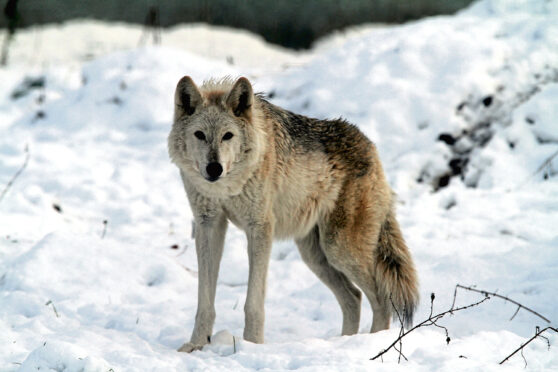
Wolves put down at a Scots wildlife park after their pack leader died would have lost their learned sense of identity, and could have panicked and viciously attacked each other, animal experts say.
Four wolves at Camperdown Wildlife Centre in Dundee were put to sleep last week after displaying “unusually anxious” behaviour following an operation to save the dominant male, who was euthanised when complications arose.
Management at the park said the animals had been exhibiting “abnormal behaviour” after pack leader Loki was taken for surgery. They said the decision was a last resort and that the team were “absolutely heartbroken”.
Zoologist Dr Isla Fishburn has worked closely with wolves and said captive animals behave very differently to their wild cousins.
She said when the group hierarchy is disrupted like this, the rest can become so stressed and confused that they can turn on each other, or even starve to death, whereas in the wild they would disperse and assimilate themselves into other packs.
“If there is a sudden change in group dynamics such as the death of the leader it can leave the others in such a state of anxiety that they lose all sense of who they are within the group,” she said.
“This can mean them attacking or even killing each other because panic levels are so high and they don’t know what to do.
“They can forget how to do learned tasks and could even starve to death.
“In the wild, when there is an occurrence like this the remaining wolves will find and join other packs but they can’t do this in captivity. They have nowhere to go so they panic and can turn on each other, even if they are related.”
The animal park has faced criticism from some commentators on its social media accounts following the move, with one calling the decision “extreme”.
This prompted the zoo to issue a statement to stress that the decision had not been taken lightly.
It said: “We can assure everyone that this difficult decision was taken following expert advice and consultation with the relevant professional bodies.
“We thank members of the public who have sent messages of support and for their kind consideration during this painful time for our team.”
Animal behaviourist Kirsty Peake, a special adviser for the UK Wolf Conservation Trust, said the keepers would sadly have had little other option than to euthanise the pack because not all wolves want to be boss – and moving the survivors into other captive wolf groups was unlikely to have been successful.
She said: “If Loki was the lead wolf in this group and the rest are males, his demise will have caused the collapse of their hierarchy system.
“In captivity there is no option to disperse, just to fight it out whether a wolf wants to do that or not.
“Not all wolves want to be boss. Moving these wolves into other captive wolf groups would have thrown out that hierarchy system too.”
The British and Irish Association of Zoos has confirmed it was aware of the incident and would be looking into it.
In 2006, a similar situation occurred at the Highland Wildlife Park, Kingussie, when six wolves were put down after showing unnatural behaviour.
A spokeswoman at the time said the pack’s leader died of natural causes and the female did not accept the next male wolf in the pecking order.

Enjoy the convenience of having The Sunday Post delivered as a digital ePaper straight to your smartphone, tablet or computer.
Subscribe for only £5.49 a month and enjoy all the benefits of the printed paper as a digital replica.
Subscribe